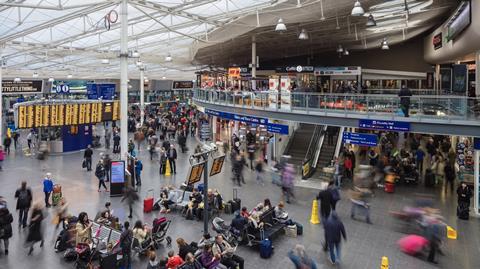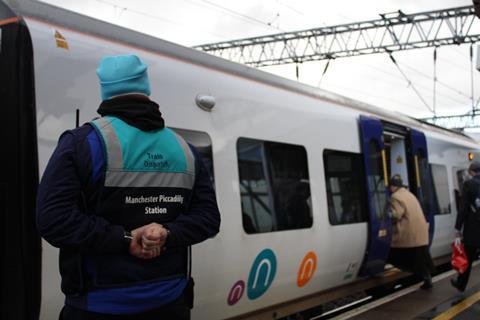
UK: The process to create an interim timetable to improve the performance of train services through Manchester from May 2022 has run into difficulties, the Transport for the North board heard at its latest meeting.
In January the Department for Transport and the rail industry produced three options for relieving congestion through the Castlefield Corridor, based on thinning out services and splitting some routes. At the time, Rail Minister Chris Heaton-Harris said that ‘we are putting the power to improve Manchester’s rail network in the hands of those that use it daily. Improving punctuality and reliability is one of my key priorities.’
Consultation on the proposals ran until March 10. It had been expected that a preferred option would be selected at TfN’s board meeting on April 16, but Greater Manchester Mayor Andy Burnham told members that earlier the same day the Rail North Committee had been informed that the Manchester Recovery Task Force, set up in January 2020 to address train performance issues in the northwest of England, had concluded that none of the three options was viable.
Industry must do better
Burnham told the TfN Board that ‘it has been made apparent to us that the options that we consulted on the May 2022 timetable were not deliverable options, and I think a number of members felt frustrated this morning about the position that we have been put in.’
‘I think we need better than this, from the rail industry’, Burnham continued. ‘If we went out to consult on options that weren’t deliverable, we would rightly be heavily criticised for wasting people’s time and it just isn’t acceptable to me that, three years on from the chaos of May 2018, we are in a position where there’s no clarity about the thinking around a workable timetable. Nor is there any clarity, still, about an infrastructure plan for central Manchester that would actually fix these things long term.

‘If I were to put together the two elements that were presented to us this morning there is no prospect of a fix to the infrastructure that would actually fix the timetable until the early 2030s. So in effect, we were being asked this morning to sign off a reduced timetable for our residents for a decade. Personally, I don’t find that in any way acceptable.’
Burnham noted that another alternative had been put forward but ‘this has not been fully modelled, or indeed, considered from its economic impact’.
Rail Business UK understands that DfT’s view is that Burnham was incorrect to say that the options were not deliverable.
Burnham’s frustration was echoed by Merseytravel Chair Liam Robinson, who suggested that even small issues over problems with level crossings in Cheshire had not been identified. ‘I do not believe the rail industry is prioritising the north of England as the Secretary of State has called on people to do to accelerate change. I think this is embarrassing, for the rail industry to put forward non-workable options in a major public consultation that lots of people have given plenty of time to, and for us to be told, at this stage, well none of it was even doable in the first place.’
Lack of clarity
Responding to Burnham’s comments, a DfT spokesperson said ‘we are committed to cutting congestion, improving punctuality and reliability, and delivering a more dependable railway which benefits passengers right across the north. We are examining responses to a consultation on all options, which will inform decisions to improve services as quickly as possible.’
Industry sources suggest the continued lack of clarity over infrastructure interventions in the Manchester area makes it difficult for any serious planning to take place, and accuse DfT of kicking the can down the road rather than bringing forward a concrete proposal.
TOCs also report that they are unable to commit to delivering new timetables because of the ongoing disruption to their resources from the Covid-19 pandemic, with significant recruitment and training backlogs contributing to the high levels of uncertainty.
TfN agreed to write to the Secretary of State for Transport and other ministers to begin a period of intensive lobbying as part of a drive to bring about a resolution to the matter.



